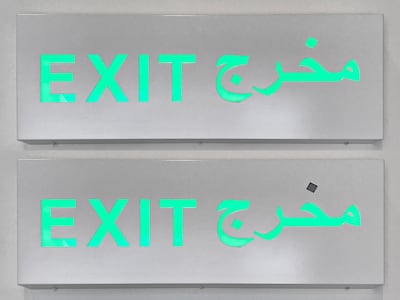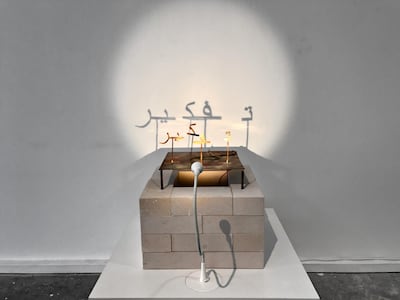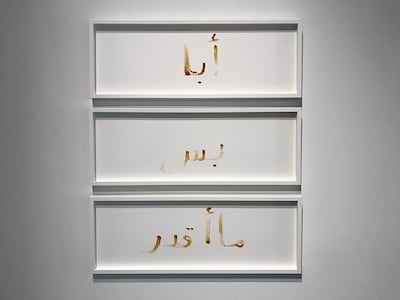When you walk in to Shamma Al Amri's new show at the Zayed University Urban Satellite Space in Dubai's Alserkal Avenue, the first thing you see is an illuminated, green "Exit" sign, written in both English and Arabic. It's a joke, of course, a playful way of subverting our expectations.
But there is something else going on, too. Look closely at the Arabic and you'll see a single dot is flashing on and off. When the dot is lit up, the word means "exit". When it is not, it means "embarrassing" or "humiliating".
The piece seems to acknowledge that making your exit – stepping out of the mainstream – can be awkward and difficult. And nearly always the right thing to do. “Are you able to have that exit strategy?” says Al Amri. “There is a frustration [in society] with binary, black-and-white ideas. And it’s becoming more exaggerated on social media.”
Word play and this idea of standing apart from the crowd pop up throughout Everything You Can Think of is True, Al Amri's first solo show in the UAE. Suspended Judgement, which Al Amri exhibited at Abu Dhabi Art last year, is a delicate motorised copper sculpture of Arabic letters, one of which ticks back and forth, changing the meaning of the word over and over again. Here the word means "thinking"; there it means "banished".
Watching something that seems so solid change with such fluidity reminds us of the need for greater nuance. “It’s about not reaching conclusions or making judgements,” says Al Amri. “It’s important to contemplate a situation rather than taking an extreme side.”
A popular Spanish song, which Al Amri says she and her school friends danced to in the 1980s, plays on repeat as the letter moves. "If you're within a group and everyone does something silly [like dancing], you're not going to stand out or be ashamed," she says. "But as soon as you are alone or the other people exit, it becomes awkward."
Al Amri, who was born and raised in the UAE, recently returned from London where she was studying for an MA in Contemporary Art Practice at the Royal College of Art. It was an experience that changed her artistic practice. “For an Arab artist to fit in, you almost have to make your work more English, otherwise it could be pigeon-holed as ‘Arabic art’,” she says. Now making art back at home, it is as if Al Amri has shrugged off a heavy coat. “I’m working in Arabic and with so many layers, it forces a western audience to consider how they access it,” she says.
Al Amri was researching graffiti in the Gulf region when she decided to make this series. She was interested in the idea that slogans sprayed onto a wall might have a strong, often political, message, but remain anonymous. Graffiti represents a collective voice. By using her tongue – the very thing that allows you to speak – Al Amri has ensured the message on the canvas is “on me as a singular person”.
The works are beautiful, mixing calligraphy with unusual materials, but the ideas can be bleak. Take "In Heaven". "To be told you'll get something in heaven actually means you're not going to get it in this lifetime," says Al Amri. "So it's a very pessimistic response."
And they do not give up their secrets easily. There are myriad interpretations and when I suggest that “I Want, But, I Can’t” is a comment on the role of women in the Middle East, she tells me it’s more about society in general. The curator of the show, Walter Willems, adds: “It’s not like you see it and then you’re gone, you have to invest in it a little bit. Shamma’s work is so very subtle and thought-through. You have to invest in the culture and the language to get it.”
Al Amri has been working in and around the UAE art scene since 2008 and she says it has come a long way. "The art scene here is doing very well compared to 10 years ago when I graduated [from university in Abu Dhabi]," she says. "It took a while for artists to come out of their comfort zone and move away from certain stereotypes. Going to London gave me more perspective, and confidence to produce what I've produced now."
Everything You Can Think of is True is on show at Zayed University Space, Alserkal Avenue, until May 5. Visit www.alserkalavenue.ae





